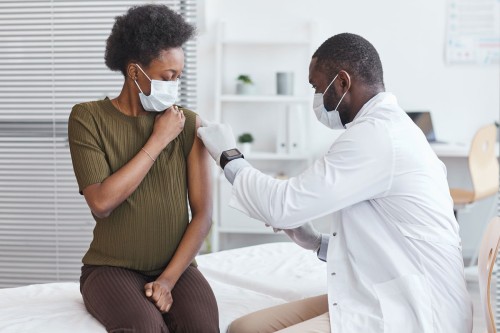
Having a vaccine that protects people from getting any cancer is a life-saving medical breakthrough; the HPV vaccine protects against many cancers – those of the cervix, anus, throat, penis, vagina, and more. All of them can result from HPV, the human papillomavirus.
“It’s far better to prevent a cancer than treat a cancer,” says Andrew Kung, Chair of the Department of Pediatrics at MSK Kids. According to the Centers for Disease Control and Prevention, getting vaccinated could prevent an estimated 92 percent of cancers attributed to HPV.
And new data confirm that the vaccine is already saving lives. The number of cervical cancer cases and deaths among American women dropped after the HPV vaccine was introduced in 2006, according to a November 2021 study in the Journal of the American Medical Association. A December 2021 study in The Lancet echoed encouraging news: It found 87% fewer cases of cervical cancer in women who had been immunized between ages 12 and 13, compared to those who were not. There were also significantly fewer cases in women who were vaccinated between ages 14 and 16 as well as 16 to 18.
The HPV vaccine stops cancers before they start. A 2019 Lancet study of 66 million young people worldwide found that the vaccine reduced pre-cancerous cervical lesions in young women by more than 50 percent.
This strong evidence in favor of the vaccine is particularly important news now. HPV has led to an alarming increase in advanced head and neck cancers, especially among white men. So it’s just as important for boys to be vaccinated as girls.
And yet, the number of parents reluctant to have their child vaccinated is rising, according to a recent study published in the journal Pediatrics. Study results indicated that some parents are worried about potential side effects of the vaccine, despite the fact that 15 years after its approval by the Food and Drug Administration (FDA), the number of side effects has been low.
It’s natural for parents to want as much information as possible about vaccines, so Dr. Kung offers these answers to key questions.
What is HPV and how does it cause cancer?
HPV is the most common sexually transmitted infection in the United States. There are more than 100 types of HPV, some of which can cause serious health problems, like cancer. There are roughly 45,000 HPV-associated cancers diagnosed each year. About 25,400 cases are in women and 19,900 are in men.
“As a pediatric oncologist, I’m often asked if there are things a parent can do to prevent their child from getting cancer,” says Dr. Kung. “The answer is yes: There are certain things that can be done in childhood to prevent cancer later, like getting vaccinated against HPV.”
The HPV vaccine does not encourage promiscuity; it protects children from developing cancer when they grow up.
Dr. Kung compares the HPV vaccine to the Hepatitis B vaccine, which children routinely receive. Hepatitis B can also spread through sexual activity and can contribute to liver cancer in adults. “The rationale for vaccinating against HPV is the same,” he says.
The vaccine has a proven track record of safety.
“The safety requirements for a vaccine to receive FDA approval are extremely high,” says Dr. Kung. The FDA looked at safety data from tens of thousands of people before approving the vaccine. Since then, the FDA has tracked results of the vaccine. As of 2018, data from more than 120 million administered doses show no evidence it causes harm, according to the National Cancer Institute.
Any side effects are minor.
The vaccine can cause a sore arm or sometimes flu-like symptoms, but they disappear after a day or so.
“When you balance that against what you’re preventing, it’s a pretty easy decision,” Dr. Kung says.
There are anecdotal stories of serious reactions or deaths associated with the vaccine, but Dr. Kung says they usually have an underlying cause. “This is not to trivialize such unfortunate events, but those are events that probably would have happened whether the person got the vaccine or not,” says Dr. Kung. “Continued monitoring of the vaccine after its approval adds to the conviction that it’s safe.”
The vaccine is recommended for children, but adults can also benefit.
The HPV vaccine is currently recommended for girls and boys beginning at 11 or 12 but as young as nine. It requires three shots over a period of several months.
In 2018, the FDA expanded the approval to include women and men aged 27 through 45.
“We want this vaccine to benefit as many people as possible,” Dr. Kung says, “including those who didn’t have it available when they were children.”




